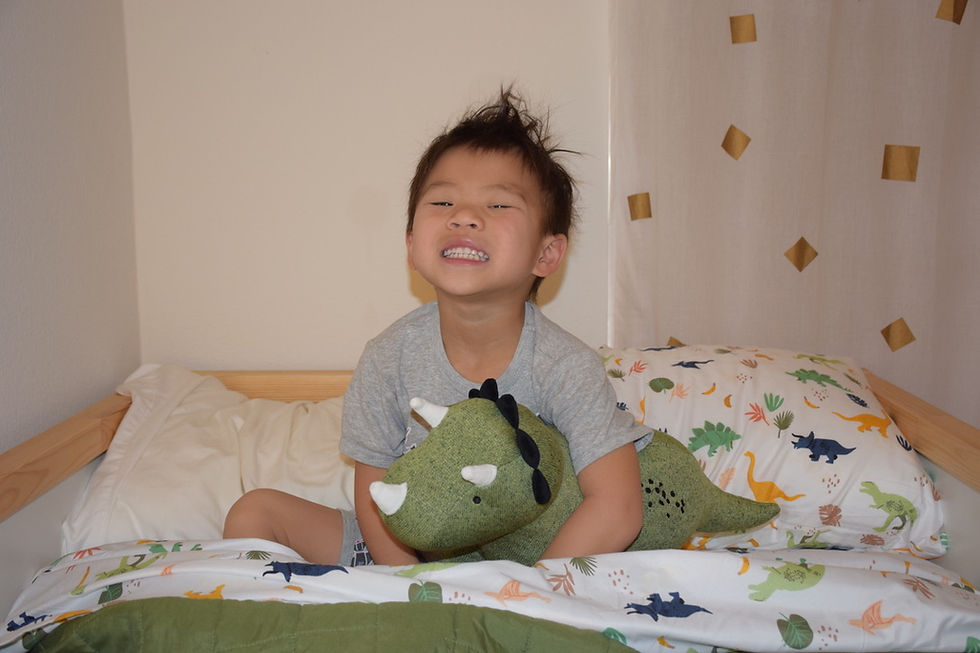Let's Not Outsource Parenting Duty to Artificial Intelligence
- To-wen Tseng

- Jul 17, 2025
- 3 min read

"Dino" was Baby J's favorite toy when he was little. Dino is a stuffed dinosaur toy—very simple. It's not even a stuffed animal, really, but more of a dinosaur-shaped pillow: a piece of green cloth stuffed with cotton, with three horns sewn on its head and two eyes embroidered on its face.
But in Baby J's mind, Dino has thoughts, personality, and all kinds of emotions.
Ever since he could talk, Baby J would report to me every day what he and Dino had done, what places they had explored, what crises they had encountered, and what problems they had solved. He wet his pants once because Dino wouldn't let him leave for the toilet. Little J's walkie-talkie disappeared because Dino had taken to call his dinosaur mom. A humongous monster once ran out from under bed at night—but Dino, brave as ever, drove it away with his horns.
This is the charm of simple toys—they don't actually move or talk, but in a child's wild imagination, a dinosaur-shaped pillow can become his best friend. Together, they can embark on grand adventures, and explore endless possibilities.
Baby J is now seven, and electronic games are gradually replacing stuffed animals and other toys in his mind. But he still like to hold Dino when he plays video games.
Last month, Mattel, the toy company that makes Barbie dolls, announced it would partner with OpenAI, the parent company of ChatGPT, to develop artificial intelligence-powered toys that can "accompany" children. I have no doubt that the development of AI opens up many opportunities and that AI chatbots are indeed powerful tools. But I just can't be optimistic about this news.
I have a lot of concerns about young children using AI.
First, the issue of privacy. Mattel acknowledged that ChatGPT is not intended for children under 13 and promised to protect the safety and privacy of child users during product development. But no one can guarantee those promises will be kept. In fact, this is not Mattel's first attempt at integrating AI into toys. In 2015, they launched "Hello Barbie," which was later reported to be vulnerable to criminals stealing children's personal information—and even pedophiles eavesdropping on conversations between kids and Barbie. Parental concerns mounted, and Hello Barbie was eventually discontinued.
Then there's the development issue. Recent studies show that AI toys may interfere with children't social, emotional, and cognitive development in many ways.
A 2021 study published in the academic journal AI & Society assessed the potential risks of AI-powered toys. The study pointed out that these toys are connected to the Internet, equipped with machine learning functions, and have increasing advanced capabilities in listening, observing, conversing and interacting. That may sound amazing—but these capabilities can actually replace a child's imagination and creativity. The magical adventures between Baby J and Dino may no longer happen. Instead, young children might sit passively in front of an AI robot toy, absorbing whatever information the toy feeds them, with little room left for their own imagination.
The study also warned that AI toys can easily foster dependence, which may lead to alienation from the real world at a very young age. This can carry into adulthood as social isolation and weakened cognitive function.
Mattel claims that the Ai toys they're developing will provide the best companionship for children. But I don't believe there is any better company in the world for a child than a attentive, loving parent. We don't want our children to become duller as AI grows smarter. Our precious little ones deserve rich, human interaction—not to be passively raised by AI-powered nannies.




Comments